PROVIDENCE, RHODE ISLAND
April 24, 2010
STRANGER: Mary Ann Sorrentino
LOCATION: Mediterraneo, 134 Atwells Avenue, Providence, Rhode Island
THEME: Lunch with an abortion rights advocate
If I could share everything I wanted to about Mary Ann Sorrentino, this entry would have to be made in installments. She has a rich history as (in order) a social caseworker, a hospital unit manager, a leading abortion rights advocate, radio talk show host, and well-read columnist.
She also possesses a natural gift of the gab that provides story after story, all interesting.
This site is a one-man operation and I lack an editor — probably obvious from my numerous grammatical faux pas — but I’ll try my best to condense Mary’s life so far into a regular-sized article. Hopefully she’ll forgive me for whatever falls by the wayside. There’s just so much to share and she’s a smart, forthright woman happy to address any topic with a strongly held opinion.
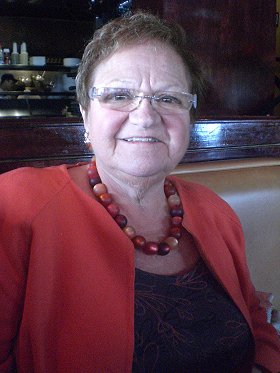
“I was always very precocious,” Mary Ann said. Her mother gave birth to Mary Ann at 40, after years of pregnancy complications that led to surgeries removing a lot of her mother’s reproductive system. “They told her she’d never have another child. She used to look at me and say, ‘this is a quarter of an ovary. Imagine if she’d been a whole ovary.’”
Imagine. At an extremely energetic 66, Mary Ann beams with a vigor that I only usually manage to capture after a 24-hour sleeping marathon followed by a pint of coffee, and a confidence that I typically only find with Dutch courage.
Within minutes of sitting down to a Saturday lunch with her, I was hooked on her natural conversational skills. No wonder she was a radio host. Her stories keep on rolling out, so many they almost trip over each other as they roll off her tongue, wrapped in a distinct Northeastern American accent that sounds like it drove through Boston but peppered by more worldly experiences.
Our interview came about after I saw Mary Ann in “Taking On The Kennedys,” a 1996 documentary about Rhode Island Democratic Rep. Patrick Kennedy’s first run for Congress. Mary Ann featured in a number of scenes holding court on her-then radio show and doing all she could to boost the prospects of Kennedy’s Republican challenger Dr. Kevin Vigilante.
Side note: Vigilante is perhaps the best surname in the world. I can almost see the grainy 1960s movie “Dr. Vigilante,” about a surgeon who takes on scumbags in his private time. In my mind, he would have been played by a slim Raymond Burr.
But I digress. When I organized a trip to Providence, I started fishing around for Mary Ann’s contact details. I tracked her down via her blog at Salon (a website for which she also writes a weekly column) After exchanging a few e-mails we agreed to meet for lunch. Our destination was Mediterraneo, a restaurant in the Federal Hill district.
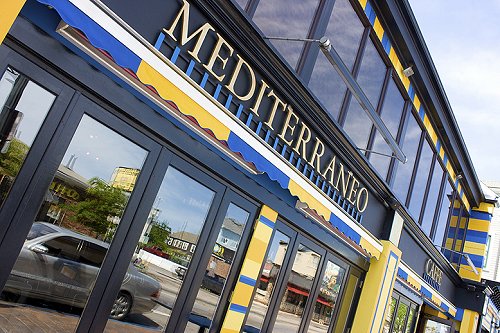
It’s a familiar area for Mary Ann, who was born and raised in Providence. She grew up granddaughter to first-generation Italian immigrants in the Mount Pleasant section of town, one of the first Italian American suburbs. Her father passed away when she was nine years old, and was raised from then on by her mother. The two had a “very close” bond, Mary Ann said. Her mother passed away in 1978, but there’s an affection in the way she talks about her mother that suggests the bond the two had decades ago remains as strong as ever.
As she dipped her fingers into her glass of water and dropped an ice cube into her $9 sweet vermouth martini, Mary Ann laid out a connect-the-dots path for how she went from precocious Providence child to fervent abortion rights advocate.
She went to college in New York studying a double major in English and psychology, with a focus on population and society. “This was the 1960s and 1970s. People weren’t worried about greenhouse gases and the ozone layer, they just worried about people having too many kids.”
But one method of population control — abortion — could have been a problematic topic for Mary Ann, raised in a traditional Catholic Italian American household. When she went to college, “I was still a virgin. I didn’t know about birth control, it wasn’t something we talked about.”
“When I became a caseworker I started getting in trouble”
Nevertheless, Mary Ann was able to separate her personal religion from discussing the issues of a woman’s right to choose, a crucial division of thought processes that would only harden over time.
She spent a junior year between 1963 and 1964 overseas at the University of Florence in her beloved Italy, before heading home to finish up her degree. After graduating, Mary Ann got her first job at what was then called the Rhode Island Department of Social Welfare. She was a caseworker overloaded with more than 100 clients, and this is where she “started getting in trouble” by applying what she’d learned about birth control in discussions with her clients.
“I was working with a lot of single mothers, many of them had several children from different fathers. So I was talking to them about birth control and referring them to Planned Parenthood,” a pro-choice organization that aims to improve women’s health and prevent unintended pregnancies.
However, this frankness with her clients about birth control methods soon landed Mary Ann in the first of a lifelong pools of hot water with Catholic opponents of abortion in her home state. “I was called into the supervisor’s office one day and told that the Catholic taxpayers of Rhode Island were not paying my salary to tell people about birth control.”
“So I fought that to the death,” Mary Ann said with a grin that reflected both happiness at defying authority and standing up for what she believed was right.
She took a second to have a sip of her martini and reflect. In the silence our waiter brought the starters. We opted for the fixed price lunch menu offering three courses at $12.96. I had the mixed greens salad (no picture, alas) and Mary Ann chose the Caesar salad.
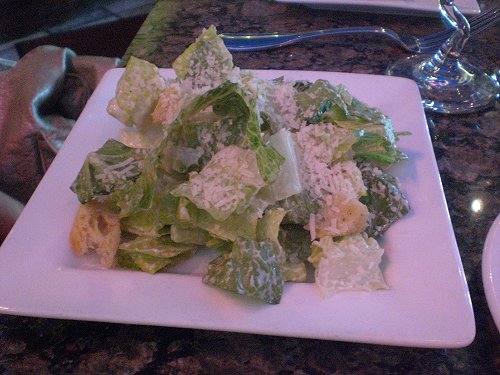
I always feel a little bad for making the interviewee talk through their meal, while I sit there throwing out the occasional question and enjoying my meal. But Mary Ann didn’t seem to mind, and enjoyed her salad. My mixed greens dish was also tasty, and I washed it down with an $8.50 mimosa that was heavy on the champagne and light on the orange juice.
While we finished our starters, Mary Ann wrapped up her personal history tour. She worked for a while as a unit manager at a Boston hospital in the 1960s — acting as a “buffer” between nursing functions and non-nursing duties — which she said was “one of my favorite jobs.”
Then around 1971 Mary Ann got a call from a staffer at the first health maintenance organization opening in Rhode Island. They wanted someone to head up a program to provide training for inner-city kids to have careers, and Mary Ann said she’d take the job. The only condition: Mary Ann wanted to bring her child to work. So she did, working with her daughter Louisa in a crib in her office, until her daughter turned three years old and went to nursery school.
Didn’t she ever feel like just being a stay-at-home mother? A quick shake of the head signified that was never an option. “After I had my baby I was so happy and doing all the traditional housewife stuff, but then I realized I can’t do this, she’s sleeping all the time and I don’t have enough to do.”
And so it was she worked her various jobs, before finally taking a job with Planned Parenthood in 1977 and staying with the organization through 1987.
“I can separate what is the law and what is right”
Abortion was at another zenith of its controversy in the United States at that time, following the Supreme Court’s 1973 ruling in Roe v. Wade that acknowledged a woman’s right to abortion, depending on the trimester of the pregnancy. But Mary Ann was raising her daughter Louisa as a Catholic, and still attending services on a regular basis. Wasn’t there an inherent contradiction with the teachings of the Catholic church? I’m not a religious person and even I know the general notion that the Catholic church opposes birth control and in particular despises abortions.
“It was always very simple for me to separate what I would do personally with what was the law and what was right,” Mary Ann said. “On abortion, I was always in a free will place that the Catholic church allows. I was determined that this is the law, it was available to people and it was up to them to decide. It wasn’t my job” to decide on other peoples’ abortions.
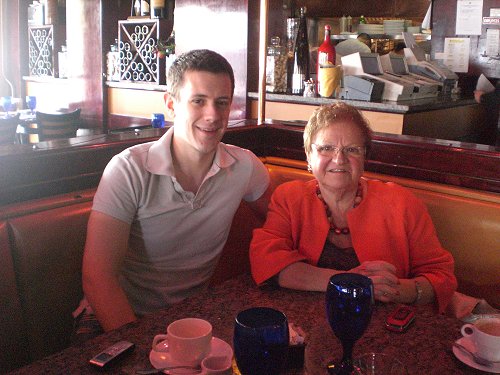
“I didn’t consider it a quantum leap” to separate being a Catholic with working at Planned Parenthood, Mary Ann said. “I just saw it as logical and right.”
Others didn’t see that simple delineation, particularly Catholic church officials.
“There I was all over the radio and television defending reproductive freedom eloquently enough that they hated it. They hated me because I was a much more attractive person to follow than they were, so finally they decided they had to shut me down,” said Mary Ann.
The church launched what Mary Ann described as a years-long fight targeted against her, first by trying to stop her daughter’s confirmation. In 1984 Mary Ann got a call at Planned Parenthood from her pastor, requesting the Sorrentino’s presence at his office.
The pastor wanted to interview Louisa before her confirmation. Mary Ann and her husband were irate, but realized how important confirmation was to her daughter and her peers. “She didn’t understand politics and philosophy then, so we went along with it.”
She described it as a “horrifying” and “unconscionable” experience, which the pastor tried to defend by saying he had to ask the questions because Louisa lived under the same roof as Mary Ann, “as if I was some sort of poisonous gas.” The way Mary Ann’s eyes bulged slightly, her voice raised a notch and her speech accelerated shows that even though it happened in the 1980s, it’s still a vivid memory.
Apparently, the pastor asked Louisa a number of questions about abortion — Mary Ann recorded the entire interview “because I knew they would lie about it” — to which her daughter replied that at her stage of life she would not get an abortion, but if someone else should consider one it would be up to them. “The perfect answer,” Mary Ann said.
Success. The pastor said the confirmation could go ahead. But then came the bitter punchline: he said Mary Ann would be excommunicated from the Catholic church.
“I said, ‘I don’t know what you’re talking about,’ and he told me it was because of my work.” She asked the pastor whether the same applied for Catholic doctors that provided abortions, and he replied, “Well, if they’re involved.”
“I am Rhode Island’s leading abortion rights advocate”
This is where Mary Ann forced the point. “I asked him how involved, and he said ‘directly,’ so I said does that mean the man who inserts the cannula in the vagina and evacuates the womb? He wouldn’t give me an answer.”
But after being excommunicated, Mary Ann knew where the church stood.
“We never spoke of it outside the family, because our daughter had been through enough,” she said. However, the church soon made that low-key approach impossible.
One day Mary Ann got a call from a reporter at the Providence Journal asking if an advertisement in the day’s paper was about her. The ad, two inches by four inches, asked, “Can Rhode Island’s leading abortion rights advocate really be Catholic?” and urged readers to tune in to a religious television show that day. Mary Ann told the reporter, “That better be about me because I am Rhode Island’s leading abortion rights advocate,” and invited her to her house to watch the show.
Catholic priest John Randall used the show as a pulpit to describe Mary Ann as “public enemy number one of the unborn,” and the ensuing back-and-forth between the church and the head of Rhode Island’s Planned Parenthood became front page fodder in the state, especially after Mary Ann divulged the details of Louisa’s treatment at her pre-confirmation interrogation.
From that point on Mary Ann was in constant demand for television, college and other appearances. She said if the church’s intent was to get rid of her it didn’t work. “I stayed at Planned Parenthood two years longer than I intended because I refused to leave and give the church the satisfaction.”
Ultimately though she did step down in early 1987, and went on to run a company providing public relations advice to non-profits. After doing this for two years she moved on to the next major career in her life: radio show host. Around 1989 she made an appointment with the program director at a local talk radio station to complain about the lack of women on air. “I said I’m the woman you need because I have the name recognition,” and she ended up with a talk show that became so successful she shut down her public relations business and focused on the radio.
Before we delved into her life as a radio personality, the main courses arrived.
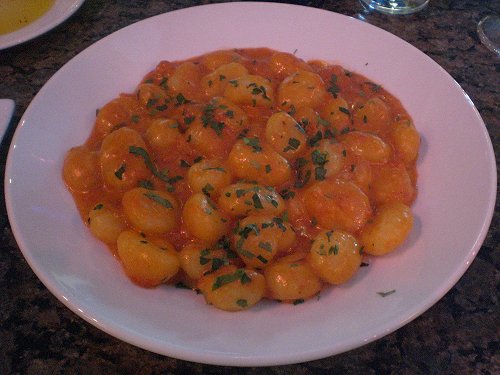
I chose the gnocchi, delicious imported potato dumplings with fresh mozzarella, tomato and basil sauce. The dish was huge, like a bucket of gnocchi pebbles, and far too much to eat in one sitting. But it was some of the best gnocchi I’ve ever had, the sauce tangy but not overpowering, and the gnocchi piping hot.
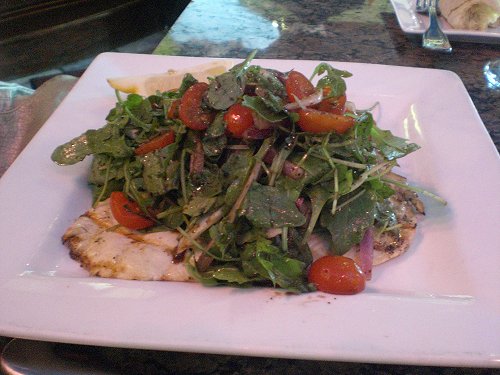
Mary Ann went for a grilled flattened chicken breast marinated in balsamic vinegar and extra virgin olive oil. The dish was topped with a baby arugula, tomato and sweet Bermuda onion salad. We were so engrossed in our interview and reliving her past experiences that, bad dining companion I am, I forgot to ask her how her dish tasted. I’m sure it was good because she ate most of it, and she is also a regular at the brightly decorated, relaxed Mediterraneo.
Back when I first started this site I said that the dinner interview was perfect because if the interviewee was dull I could write more about the restaurant, and vice versa if the stranger was compelling. Such was the case with Mary Ann, and though this interview is focused more on her life, that’s not to knock Mediterraneo, a fun place with great food and very personable waiters.
And so, let’s shift the story back to Mary Ann. One of the highlights of her radio career was a running gag about what she saw as Patrick Kennedy’s inadequate qualifications for office, which was covered in “Taking on the Kennedys.” She thought Kennedy “was always nice and lovely, but I have a lot of lovely nieces and nephews and I wouldn’t send them to Congress either.”
While she made disparaging remarks about Kennedy’s political abilities on air, Mary Ann says she was pleased to find him a winning personality on the handful of occasions when they met face-to-face. And now she looks back on her time covering him almost fondly. “I always saw in him a good kid who hated his job. My impression was that he was trying to please his dad Ted Kennedy and trying to carry a mantle that his shoulders weren’t nearly broad enough to carry.”
Despite on-air jokes that included making the song “If I Only Had A Brain” her theme tune for Kennedy, Mary Ann said, “I wish him well.” Kennedy is stepping down from office at the November 2010 congressional elections. “I hope he can be whoever he is in peace and do whatever he wants and have some life which I don’t think his family or his life allowed him,” Mary Ann said.
“I don’t understand writer’s block”
Mary Ann moved on from her radio show several years ago, long before Kennedy decided to retire from politics. She now lives a “relatively quiet life” focusing on writing.
Yes, she’s still keeping a national profile but now in the Internet age — yet another career move. She splits her time between winters in Florida and summers in Rhode Island, but always manages to hit her Friday deadline for the online magazine Salon.
“I have a feeling that Salon originally wanted me to write for them because they saw me as someone who can always write about abortion and the church. But you can’t write about that 52 weeks a year. That would be boring,” Mary Ann said. So her column focuses on a broad range of topics, all from her distinct point of view. The word “opinionated” has negative connotations to some, but to me it’s a positive way of describing Mary Ann. She knows who she is and what she believes in.
“I don’t understand writers’ block. Do you have a pulse? If so, how could you have writers’ block?” she asked as her bright eyes took in the street view outside the restaurant. “I’m looking out this window and I see about five columns I could write. There’s something to say about of a lot of things in this world. But it needs to be something of interest to someone in Omaha, and a beatnik in Venice Beach, a conservative in Chicago and even people from around the world.”
Mary Ann is also a syndicated newspaper columnist, in particular for the Keene Sentinel, a New Hampshire paper. Spiraling industry costs led the paper to drop her column after almost 10 years, but then three years later she got a phone call from the editor asking how much it would cost to get her back. Apparently, people had flagged the editor down on his walks around town asking whatever happened to Mary Ann Sorrentino. And so she was back in print. “That’s such a compliment because there are a million columns and they said they missed mine. I still write for them, I love them and I love the readers,” she said with a smile as our final course arrived.
Although the fixed price menu offers a starter, main course and dessert, Mary Ann opted for a coffee rather than dessert. I however have the greed of the proverbial pig at the trough, and so I went for the house-made tiramisu and a $3 cup of coffee (a bit pricey for the caffeine hit).
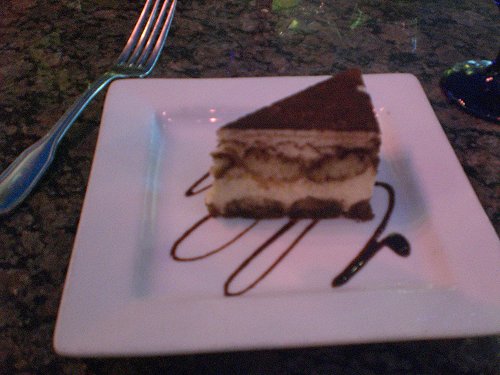
Oh my. That tiramisu was wonderful. Soft, creamy, and with strong flavors. I fear Mary Ann must have thought she sat down in a pig sty because I’m sure I wolfed my dessert down with alarming speed. Here’s hoping I didn’t leave debris in the wake of how quickly I ate it. Mary Ann didn’t have to wipe her glasses clean, so I think perhaps I kept my manners in check.
As we wrapped up a highly enjoyable lunch, Mary Ann let a broad smile out as she summed up her life these days. “I’m very blessed. Fortunately I don’t have to support myself. If I don’t make the kind of money I have made at various points in my life it doesn’t matter. I have the luxury of doing things that matter to me and seem important to me and that I hope will make a difference.”
Yet it all comes back to abortion, a subject for which she still has limitless energy. Indeed, she wrote a book about her time at Planned Parenthood and experiences in the field called “Abortion: The A Word” that has found its home on college campuses.
We had a brief post-lunch chat about the recent health care reform debate in America, in which possible federal funding for abortion became a potential stumbling block. This infuriated Mary Ann, who sees the anti-abortion campaign led by men who seize on scare tactics to drum up support.
“Women today take abortion rights for granted”
“I don’t believe in abortion on demand,” she said, stressing that 95 percent of abortions are done in the first 10 weeks but claiming that abortion opponents focus on one example of someone who terminates a pregnancy in the eight or ninth month. “Clearly a fetus that has developed for eight months and which could survive outside of the womb is a different consideration. I don’t say it shouldn’t happen that a woman shouldn’t have that choice, I say that it needs to be more thoughtful.”
This thoughtfulness should extend to opponents of abortion, Mary Ann said. “For those who truly oppose it on a moral ground I understand that passion. But it doesn’t justify killing doctors. I don’t see those moral people in marches or shooting doctors. I see a bunch of men who are delusional, power-hungry, sometimes wacky and controlling, and who have no standing in this discussion.”
She added, “You don’t see that many women of conscience in the right to life movement,” but it’s important to her that young women get involved in defending abortion rights.
That’s one of the reasons she wrote her book. “Women in college today know that if they find themselves facing an unwanted pregnancy they can keep it, put it up for adoption, or terminate the pregnancy. They have no idea what it means to wake up with an unintended pregnancy and to know that you have to risk your life to terminate the pregnancy and break the law and all kinds of degrading things that happened to women in my generation.
“Women today have no idea, they take it for granted. They have no fire in the belly and I want them to, otherwise they’ll lose it.”
All too soon, our lunch was at an end. I paid the check, and then walked Mary Ann out the door, on to the next chapter of her epic life story.
I never knew about Mary Ann’s story. I moved to Rhode Island in 2017 and had not known about her story. I happened upon this column and had questions about believing about having a pro-choice stance and growing up Catholic. I still have that belief and others.
I am still pro- choice but have questions about both being a lapse Catholic and pro-choice. Any guidance?
Mary Anne as I see it you are refecting your mother’s anguish and regrets that she. Had.t to. Raise you at a late stage in her life.
This has caused you to have a hatred to your own self, expressing as much as to impose such hurt would naturally occer over the event of an unplanned pregnancy on other new mother’s
Suggesting that such burdens could be overwhelming for those without the proper means of support.
Well I have two boys first one was born out of wedlock unplanned , and with complications.
He was breach and his head was.to large for normal delivery
This resulted into an excruciating 36 hr labor , which could have resulted in death of mother and or child.. leaving child with permanent congoctional disabilities.
My second was unplanned also, and again with complications.he was born with the most severest forms of club foot, his foot was on completely sideways and his leg was bent in so as he could touch his face with the flat of his foot.
While these burdens would be to great for a young mother , there was yet another blow five. Years later another unplanned pregnancy, this time the baby didn’t make it, died in womb unexpectedly at a late term.
This was not only dangerous to the health of the mother physically , but mentally as well.
So we’re am I going with this, well here’s what resulted of all this.
Father of fist child eloped and married mother, after first year, after his birth, because a co-worker called his son a bastard in the eyes of the Catholic Church..He was so enraged that he struck the man in the mouth at work, resulting in time off..
We coniuedy to struggle financially with. Several jobs and drs appointments never getting ahead,let alone anything for one’s self.
Present day looking back, we as a family shared hardships, laughter and.most important love.
After 25 years of marriage I wouldn’t trade it for the world.
.
i4iq5s
q7mf1w